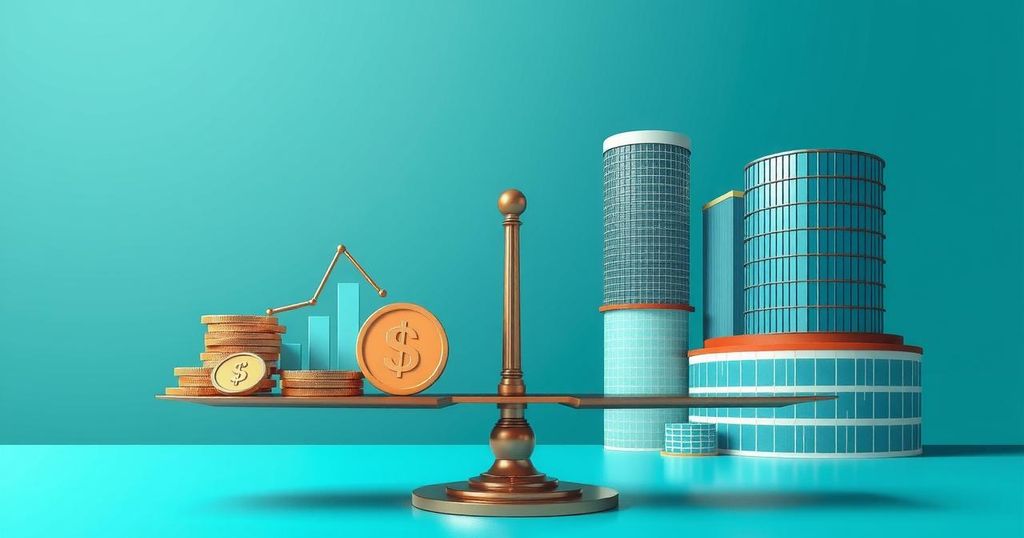Tinubu’s Tax Reforms: A New Era for Nigeria’s Economy

President Bola Ahmed Tinubu’s economic reforms focus on tax restructuring, aiming to revitalize Nigeria’s economy and enhance fairness in taxation. Key measures include exempting minimum wage earners from personal income tax, maintaining the VAT rate, and raising tax thresholds for small businesses. Despite some labor opposition, supporters believe these initiatives will foster long-term economic growth and stability.
President Bola Ahmed Tinubu’s economic reforms in Nigeria focus on tax restructuring and are being recognized for their potential impact. These policies aim to revitalize the economy, foster fairness in taxation, and enhance investor confidence. Supporters believe these initiatives could lay the groundwork for sustainable economic growth despite facing some criticism.
Upon his assumption of office in 2023, President Tinubu recognized the struggling economy and chose to implement bold changes rather than adhering to ineffective policies. One significant achievement is the introduction of the Tax Reform Bills designed to simplify the tax system, relieve the worker burden, and create a more equitable economic framework.
A key component of Tinubu’s reforms is the exemption of minimum wage earners from personal income tax, providing relief to low-income individuals. Furthermore, despite initial proposals to raise the VAT rate to 12.5%, it remains at 7.5%, thus alleviating inflation pressures on Nigerians. Small businesses will also benefit from a raised tax exemption threshold from ₦25 million to ₦50 million in annual turnover, promoting growth without excessive taxation. Additionally, the corporate income tax for larger enterprises has decreased from 30% to 25%, encouraging investments and job creation.
Arabinrin Aderonke, a tax analyst, has emphasized the importance of these measures, stating, “These reforms show the Renewed Hope Agenda’s commitment to a tax system that is fair, simple, and good for business.”
Nonetheless, labor organizations, represented by the Nigeria Labour Congress (NLC) President Joe Ajaero, have voiced opposition to the Tax Reform Bill, raising concerns that have ignited discussions on its validity. Analysts argue that the reforms prioritize workers’ welfare by lowering personal income taxes and improving affordability through VAT exemptions. Aderonke has questioned whether Ajaero’s apprehensions stem from a misunderstanding, suggesting that the bill mainly benefits low- and middle-income earners.
Moreover, the reforms include a revised VAT revenue-sharing formula that allocates 60% of VAT proceeds to the states where services are consumed, empowering state governments to invest in vital sectors like infrastructure, education, and healthcare. The establishment of the Office of Tax Ombud further ensures efficient resolution of tax disputes, safeguarding businesses from arbitrary assessments.
Supporters contend that these reforms lay the essential groundwork for a sustainable economy, enhancing investor confidence and facilitating job creation, thus advancing national development by making taxation more equitable and conducive to business. Aderonke concludes, “President Tinubu is building the foundation for a stronger and more prosperous Nigeria. His leadership is focused on economic stability, innovation, and fairness for all.”
As the Senate nears approval of the Tax Reform Bills, there is cautious optimism among Nigerians. If implemented effectively, these reforms may signify the commencement of a new chapter in Nigeria’s journey towards economic stability and prosperity.
In summary, President Bola Ahmed Tinubu’s economic reforms are significantly reshaping Nigeria’s financial landscape through comprehensive tax restructuring. By focusing on relief for low-income workers and fostering an attractive environment for businesses, these policies appear aimed at facilitating sustainable economic growth and enhancing overall stability. The ongoing debates surrounding the reforms indicate a crucial balancing act between governmental objectives and labor interests that may shape Nigeria’s economic future.
Original Source: www.pulse.ng








